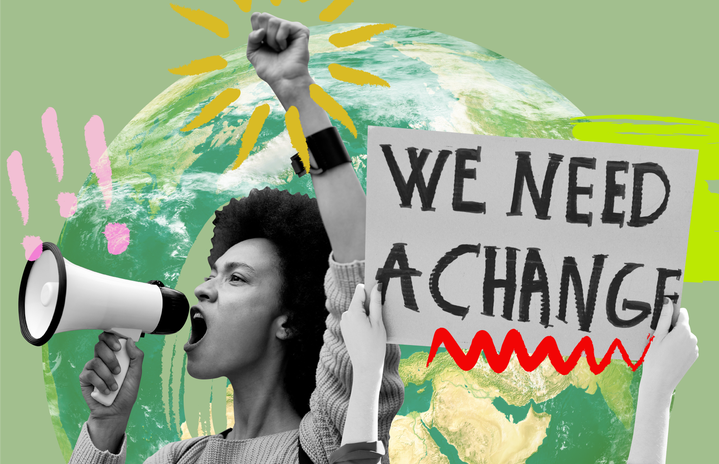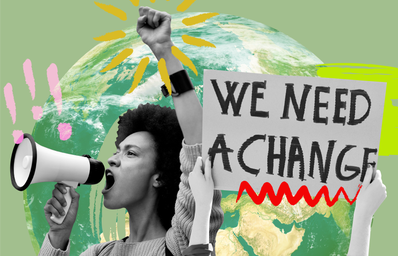Climate change has been a hot topic for the last decade, and it’s likely to continue to be on our social media and newspapers for the foreseeable future, so let’s get the facts straight: what is changing in our climate and what do we need to change?
What is our current global climate state?
Last year, 2022, was the sixth warmest year since records began 143 years ago, averaging at 13.9°C. To put it into perspective, the 10 warmest years ever, since records began, have all been since 2010. 2022 achieved the highest record sea level, with sea level rise increasing throughout the whole of the 20th century. On top of this, there have been record lows for glacier melts and record highs of extreme weather events, from unbearable droughts in Africa to devastating floods in Pakistan and wildfires all over. Our planet is changing too fast, making it harder for all organisms to live and survive on Earth, it will only get worse if we don’t act now.
What will happen if our planet keeps changing?
Our earth’s ecosystems will eventually reach their tipping points. What are tipping points you may ask? Put simply, it’s a threshold, so once crossed this will lead to large, accelerating change, which can be irreversible, as well as triggering other tipping points. Examples include the thawing of permafrost, droughts in the Amazon Rainforest, and reduction in the area of Arctic sea ice. There are many tipping points, some likely to occur sooner than others, with the main trigger likely to be an increase to 1.5°C global warming, according to a new study, while our world is heading for a 2-3°C global warming! So, what do we need to do?
To get the biggest positive effect on our climate, we humans first need to understand what sectors of our lives are causing climate change.
Most of us will have heard this many times before: burning fossil fuels (oil, gas, and coal), releases greenhouse gases (GHG) into the air, heating up our world (which will trigger many tipping points soon)! Electricity and industry produce the most GHG, followed closely by agriculture, land use and waste, then transport and buildings.
What needs to be done to save our planet?
Big corporate change is the most effective way to achieve a drastic change for our planet. Although it’s easy to say buy green energy, such as solar panels, not everyone is able to do this, and it’s known that (generally) sustainable, green alternatives are more expensive. The government needs to make policies and incentives to help energy companies become greener and make prices affordable to the public. But in the meantime, it’s important to use our individual power to look at what political parties or other organisations are supporting these movements, so we can push the ideas forward. The same government intervention is needed for industry GHG to be reduced effectively; however, we can help by supporting the brands and companies, of daily products, that are changing their manufacturing ways to reduce their effect on the environment.
Sustainable agricultural methods are needed, from using fewer chemicals to alternating grounds, but quite frankly this could take time that we don’t have, as this won’t provide the bigger companies with the economic profits and growth that they can get in the short-term. The difference is all the change that is needed, will cost us in the short term regarding major profits for the bigger companies, but will benefit everyone in the long-term, from living in a more stable climate to more eco-system services provided by nature. Rewards will be granted once we make the change! After all, why wouldn’t we want to save our planet?
Public transportation needs to be improved, as it is more sustainable than every individual driving a car to work, producing GHG fumes. Big changes are needed, including making public transportation cheaper and more accessible and reliable, so we can depend on it to get us to work on time, instead of wishing we drove ourselves there.
What can we do as individuals?
This is a controversial topic, which surprised me, apparently many believe that we as individuals can’t do anything about the climate crisis that we are in. I disagree. If everyone thought like this, we would never get the change we need. To change little things in your daily routine that will reduce your GHG emissions, will help, and inspire many. There are also so many benefits for yourselves by making small changes on a daily, for a global benefit. Examples can include greener transport modes, eating less red meat or adopting a plant-based diet, using eco-friendly products in your skin/makeup routine, and overall buying less, which is understandably difficult while living in an over-consuming world. Change is destined to come, so why not be the help that’s needed, which will benefit you too?
If you want to learn more about how you as an individual can do your bit, stay tuned for further articles on all things sustainable! I want to know how I can reduce my carbon footprint to help the planet, after understanding the crisis we are in. I hope you have learned from my more science-based article and can take this information with you in your daily lives. Join me on my journey to be a sustainable queen! Bye for now…


